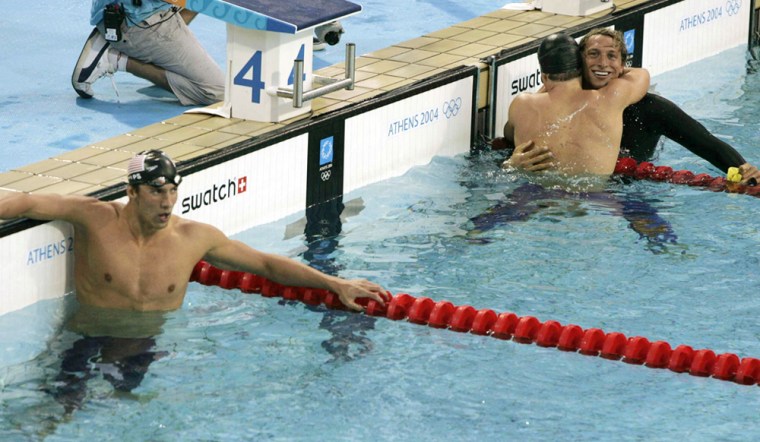Michael Phelps looked young. He was exposed by Ian Thorpe of Australia to be exactly what he is, a swimmer who still has some boy in him.
Phelps was callow enough to actually announce his ambition of winning seven Olympic gold medals. While it was a fine aim, one thing Phelps may have learned Monday night is that perhaps such a thing is better left unsaid, because his attempt is over after just three races, and some will no doubt call it a disappointment. The problem with announcing that you want to make history is that it gets noticed if you don't.
Phelps won his third medal of the Olympics, but it was the wrong substance, a bronze, in what was the most widely anticipated event of the Olympics thus far, the 200-meter freestyle. Phelps finished a close third behind world record holder Thorpe and defending Olympic champion Pieter van den Hoogenband, and while the time differential was about as long as a handclap, there was no mistake that Phelps had been decisively beaten. The main impression left in the water by Phelps was that he has some growing to do. The others guys just looked and swam bigger. And Phelps is still young enough to refer to the Flying Dutchman as "Hoagenbond."
But give Phelps all kinds of credit: You don't make sports history by aiming low and then hoping you'll just sort of, accidentally, maybe, if things go right, win seven golds. (Also, you don't make a fortune in pre-Olympic ad campaigns). And you don't become the best ever by limiting yourself. Which was why Phelps threw himself into the pool against swimmers who were clearly more accomplished and superior in an event, the 200 free, that is not his strongest.
"How can I be disappointed?" he said afterward. "I swam in a field with two of the fastest freestylers of all time, and I was right there with them."
Thorpe has dominated the 200 free for years, his only significant loss in Sydney four years ago to van den Hoogenband. But Phelps couldn't resist the race, calling it potentially "historical." After the preliminary heats, Phelps's personal coach Bob Bowman said, "He just wanted to be in that race. I have no idea if he can win or not, but I think he'll put up a really good time."
Bowman was correct in his prediction. Phelps started in Lane 3, with van den Hoogenband to his left and Thorpe a lane farther over. The flags ringing the aquatic stadium were blown straight by the Meltemi wind as the swimmers bent down to the starting blocks amid a wall of sound from the crowd.
It's not often Phelps looks small, at 6 feet 4. But Thorpe dwarfed everyone; in his black neck-to-wrist-to-ankle racing skins, he was a massive mutant seal with arms. And then there was van den Hoogenband, a giant Dutchman and an equally intimidating presence, who swam the first 100 meters in one second under world record pace.
By comparison, Phelps seemed slight, and his long arms, for once, seemed foreshortened as he spent the entire race in no better than third place. Thorpe reached out and pulled at the water as if he were climbing through it, while the Dutchman matched him hand-to-hand. The difference was Thorpe's sheer reach. The Australian set an Olympic record of 1 minute 44.71 seconds, to the Dutchman's 1:45.23. Phelps darted to the wall just a beat behind them.
But it was an American record and a personal best for Phelps, and that meant something. It meant that he doesn't fold or fade. Phelps had every chance to do just that after suffering a dejecting loss in the 400 freestyle relay Sunday night, when the Americans took a bronze in an event they were heavily favored to win. It cost Phelps any chance of surpassing Mark Spitz, who won seven golds at the Munich Games in 1972.
Instead Phelps bounced back, and swam a game race against Thorpe and van den Hoogenband, and missed a silver medal by a mere tenth of a second. He took it well and made certain to smile on the podium. Afterward, he suggested that despite his status as the most versatile and impressive young swimmer in the world, he's still a work in progress who is learning as he goes.
Phelps has only swum three races of a total of eight, but one thing he has learned is that the Olympics are different from any other event, and nothing can simulate their pressures, not even the famously tense Olympic trials. They are the end, the ultimate object, and so every effort put forth is slightly more concentrated, every breath drawn is a little more tense. "It takes a lot more out of you," Phelps said. "I think it's definitely a lot different from the trials, a whole lot more emotionally draining."
After winning another American gold medal in the 100 backstroke, Aaron Peirsol hazarded the statement during his news conference that Phelps is still "the greatest swimmer in the world." From the back, an Australian journalist spoke up. "If Michael Phelps is the greatest swimmer in the world, what does that make Ian Thorpe?" Peirsol was asked.
Peirsol started to defend his words, and then tried to suggest that maybe they were equals. Then he paused. "You know what? I retract the statement," he said.
But Peirsol was merely stating what everyone knows: that Phelps is a massive young talent and the future is entirely his. The present also looks extremely promising.
"He's capable of going home with eight medals," Peirsol said. "That's unheard of." Thorpe, too, agreed with the assessment. "I don't think Michael Phelps is an emerging swimmer anymore," Thorpe said. "Get that clear."
Phelps's failed bid wasn't the end of something. It's just the beginning.
